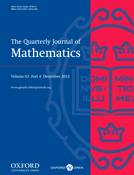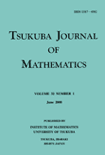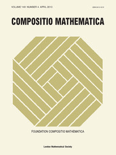
Selecta Mathematica-New Series
Scope & Guideline
Advancing Understanding in Dynamic Scientific Fields.
Introduction
Aims and Scopes
- Algebraic Geometry and Commutative Algebra:
The journal frequently publishes research related to algebraic geometry, focusing on topics such as schemes, varieties, and their properties. The interplay between algebra and geometry is a consistent theme, with numerous studies on moduli spaces, birational geometry, and related conjectures. - Representation Theory:
Representation theory is another core area, where the journal features papers discussing various representations of algebraic structures, including Lie algebras and quantum groups. This area often intersects with algebraic geometry and mathematical physics. - Homological Algebra and Category Theory:
Research on homological algebra, derived categories, and their applications is prevalent. This includes studies of functor categories, derived invariants, and categorical structures, reflecting a strong emphasis on abstract mathematical frameworks. - Topological and Geometric Methods:
The journal highlights research employing topological methods to address problems in various areas, including algebraic topology, symplectic geometry, and the study of manifolds. This includes the exploration of invariants and geometric structures. - Mathematical Physics:
There is a notable focus on mathematical physics, particularly in areas such as quantum field theory, algebraic topology, and integrable systems. Papers often explore connections between mathematical structures and physical theories, showcasing the journal's interdisciplinary approach. - Number Theory and Arithmetic Geometry:
The journal includes works that delve into number theory and its geometric aspects, often involving schemes, motives, and the interplay between arithmetic properties and geometric structures.
Trending and Emerging
- Derived Categories and Homotopical Algebra:
There is an increasing emphasis on derived categories and homotopical methods across various mathematical fields. This trend includes the exploration of new invariants and the relationships between different categorical frameworks. - Tropical Geometry and Its Applications:
Tropical geometry is gaining traction, with more papers exploring its applications in algebraic geometry and combinatorics. This emerging field is being integrated into classical theories, indicating a broader acceptance and interest in its methodologies. - Quantum Algebra and Categorification:
The trend towards quantum algebra and categorification is prominent, with research delving into quantum groups, categorified structures, and their applications in representation theory and geometry. This reflects a growing intersection between algebra and quantum physics. - Geometric Representation Theory:
Research in geometric representation theory is on the rise, particularly studies that link representation theory with algebraic geometry and topology. This emerging theme highlights the interdisciplinary nature of modern mathematics. - Mathematical Aspects of Machine Learning:
An increasing number of papers are addressing the mathematical foundations of machine learning, exploring topics such as optimization, statistical learning theory, and the geometry of data. This trend indicates a growing interest in applying advanced mathematical concepts to computational problems.
Declining or Waning
- Classical Algebraic Geometry:
Research specifically focused on classical aspects of algebraic geometry, such as the study of classical curves and surfaces, appears to be less frequent. The community has shifted towards more modern or abstract approaches, integrating concepts from algebraic topology and homological algebra. - Elementary Number Theory:
Papers centered exclusively on elementary number theory seem to be declining. The journal's focus has moved towards more complex interrelations between number theory and geometry, particularly in arithmetic geometry and its applications. - Real Analysis and Classical Analysis:
There is a noticeable reduction in submissions related to classical real analysis. The journal appears to be prioritizing more abstract and higher-dimensional analyses that connect to algebraic and geometric frameworks. - Combinatorial Geometry:
Research in combinatorial geometry has become less prevalent. The journal's recent publications indicate a trend towards more algebraically and topologically rigorous studies rather than combinatorial methods.
Similar Journals

QUARTERLY JOURNAL OF MATHEMATICS
Illuminating the Path of Mathematical DiscoveryQuarterly Journal of Mathematics, published by Oxford University Press, stands as a pivotal resource for the mathematical community, focusing on a broad spectrum of topics in the field of mathematics. With its esteemed history dating back to 1930, this journal continues to foster innovative research and discussions, providing a platform for scholars to share their findings and insights. Although the journal currently holds a Q3 classification in mathematics (miscellaneous) and is ranked #207 among general mathematics publications in the Scopus database, its commitment to quality and rigorous peer review ensures that it remains relevant and insightful. Researchers, professionals, and students alike will find the Quarterly Journal of Mathematics an invaluable tool for advancing knowledge and understanding in various mathematical disciplines, making it an essential addition to any academic library.

MANUSCRIPTA MATHEMATICA
Connecting Scholars through Rigorous Peer Review.MANUSCRIPTA MATHEMATICA is an esteemed journal in the field of mathematics, published by Springer Heidelberg. Since its inception in 1969, this journal has served as a pivotal platform for disseminating high-quality research in a variety of mathematical disciplines, with a commitment to advancing knowledge and fostering collaboration among mathematicians. The journal holds a commendable impact factor and is ranked within the Q2 category for Mathematics (miscellaneous) in 2023, placing it favorably among its peers in terms of academic influence. Although open access options are not available, its rigorous peer-review process ensures that published articles maintain the highest academic standards. With a wide scope covering significant areas of general mathematics, MANUSCRIPTA MATHEMATICA not only caters to researchers and professionals seeking innovative insights but also serves as a valuable resource for students eager to deepen their understanding of mathematical theories and applications. For those looking to contribute to or stay informed about advancements in this dynamic field, the journal remains a crucial resource for literature and discourse.

Tsukuba Journal of Mathematics
Advancing Mathematical Frontiers with Rigorous ResearchTsukuba Journal of Mathematics is a distinguished publication dedicated to advancing the field of mathematics through the dissemination of innovative research and comprehensive studies. Published by the University of Tsukuba, Department of Mathematics, this journal serves as a vital platform for mathematicians, researchers, and students to engage with cutting-edge mathematical theories and methodologies. Although currently not available as an open-access journal, it maintains a strong academic presence, contributing significantly to the global mathematical landscape. The journal invites submissions across various branches of mathematics, aiming to foster scholarly communication and collaboration. The ISSN 0387-4982 and the E-ISSN 2423-821X further establish its credibility and accessibility among the academic community, supporting its critical objective of facilitating high-quality research output. Situated in Tsukuba, Japan, a hub for scientific research and development, the Tsukuba Journal of Mathematics is committed to bridging gaps in mathematical knowledge and encouraging exploration of novel ideas.

JOURNAL OF THE AMERICAN MATHEMATICAL SOCIETY
Fostering Insightful Discourse in Mathematical SciencesThe Journal of the American Mathematical Society (ISSN: 0894-0347; E-ISSN: 1088-6834), published by the American Mathematical Society, stands as a pillar in the fields of mathematics and applied mathematics. This prestigious journal, with a remarkable impact factor and ranking in the top tier (*Q1*) within both the Applied Mathematics and general Mathematics categories, is recognized for its contribution to advancing mathematical research and theory. With data reflecting it as the 8th ranked journal in General Mathematics (top 2%) and the 34th in Applied Mathematics (top 6%), the journal consistently showcases groundbreaking studies and innovative methods that greatly influence academia and industry alike. Though not an open-access journal, it offers a wealth of resources and intellectual discourse for researchers, professionals, and students alike. Specializing in comprehensive and theoretical aspects of mathematics, the Journal remains dedicated to publishing articles that promote understanding and propel the field forward, highlighting its significance as an essential tool for those engaged in mathematical research.

COMPOSITIO MATHEMATICA
Enriching the World of Mathematics Since 1996COMPOSITIO MATHEMATICA, published by Cambridge University Press, is a leading journal in the field of mathematics, with a specific focus on algebra and number theory. With an impressive impact factor and ranked in the Q1 quartile for its category, it holds a prominent position in the academic landscape, currently standing at Rank #26 out of 119 journals in its field, within the 78th percentile of its category, according to Scopus rankings. Since its inception in 1996, the journal has been dedicated to publishing high-quality research articles that contribute significantly to the advancement of mathematical knowledge and theory. While it does not offer open access, the journal ensures a rigorous peer-review process that upholds the highest academic standards. Researchers, professionals, and students alike are encouraged to engage with the rich, innovative content of COMPOSITIO MATHEMATICA, which continues to foster a vibrant scholarly community dedicated to exploration and discovery in mathematics.

JOURNAL OF THE EUROPEAN MATHEMATICAL SOCIETY
Pioneering Open Access in MathematicsThe JOURNAL OF THE EUROPEAN MATHEMATICAL SOCIETY, published by the EUROPEAN MATHEMATICAL SOCIETY (EMS), stands as a premier platform in the field of mathematics, known for its rigorous editorial standards and impactful contributions to both applied and theoretical aspects of the discipline. With a commendable Q1 ranking in both Applied Mathematics and Miscellaneous Mathematics categories, alongside a Scopus rank of 32 out of 399 in General Mathematics, this journal has established itself as a crucial resource for researchers and professionals. Since achieving Open Access status in 2021, it has expanded its reach, making cutting-edge research more accessible to a global audience. With a publication horizon extending from 2002 to 2024 and a dedicated focus on high-quality mathematical scholarship, the journal continues to foster innovation and collaboration within the mathematical community.

Journal of Homotopy and Related Structures
Exploring the Depths of Mathematical StructuresJournal of Homotopy and Related Structures is a distinguished academic journal published by Springer Heidelberg, specializing in the fields of algebra, number theory, geometry, and topology. With a focus on the intricate relationships and structures within these disciplines, the journal aims to facilitate the dissemination of original research and provide a platform for scholarly exchange among mathematicians. Since its inception in 2012, the journal has positioned itself in the Q2 category for both Algebra and Number Theory and Geometry and Topology in 2023, reflecting its growing influence and commitment to high-quality publications. Although it operates under a subscription model, the research published in this journal is highly cited, contributing to its notable rankings—#57 in Geometry and Topology and #65 in Algebra and Number Theory on the Scopus index. This journal is an essential resource for researchers, professionals, and students who wish to stay updated with the latest advancements and trends in homotopy theory and related mathematical structures.

RENDICONTI DEL SEMINARIO MATEMATICO DELLA UNIVERSITA DI PADOVA
Pioneering discoveries in mathematics, one paper at a time.RENDICONTI DEL SEMINARIO MATEMATICO DELLA UNIVERSITA DI PADOVA, published by the European Mathematical Society, stands as a notable open-access journal with a rich history in disseminating research across various domains of mathematics. With an ISSN of 0041-8994 and E-ISSN 2240-2926, this journal has embraced open access since 2023, significantly enhancing its visibility and accessibility to a global audience. Situated in Germany, its publishing house is based at Technical University Berlin, which emphasizes its academic roots and dedication to fostering mathematical research. The journal features a quartile ranking of Q3 across multiple categories including Algebra and Number Theory, Analysis, Geometry and Topology, and Mathematical Physics as of 2023, indicating a vibrant contribution to the field, despite its challenge in specific rankings. Researchers, professionals, and students alike will find in this journal a platform for innovative ideas and significant findings that are crucial to the evolution of modern mathematics.

New York Journal of Mathematics
Catalyzing collaboration in the mathematical community.New York Journal of Mathematics is a prominent open-access journal, published by the ELECTRONIC JOURNALS PROJECT, dedicated to advancing the field of mathematics through the dissemination of groundbreaking research. Since its inception in 1996, the journal has evolved into a valuable resource for researchers, educators, and students, particularly in the realm of general mathematics. As of 2023, it proudly holds a Q2 classification in the Mathematics (miscellaneous) category, reflecting its growing impact and reach within the academic community, despite being ranked at the 31st percentile overall. With its commitment to open access since 2022, the journal ensures that high-quality mathematical research is readily available to a global audience, fostering collaboration and innovation. Researchers interested in contributing to this dynamic field will find the journal a vital platform for sharing their findings and engaging with fellow mathematicians around the world.

ANNALES DE L INSTITUT FOURIER
Unveiling New Perspectives in Algebra and GeometryANNALES DE L INSTITUT FOURIER is a premier academic journal published by ANNALES INST FOURIER, specializing in the fields of Algebra and Number Theory as well as Geometry and Topology. Since its establishment, the journal has garnered a distinguished reputation, evidenced by its Q1 quartile ranking in the 2023 category assessments and its Scopus Rank of #37 out of 119 in Algebra and Number Theory, and #34 out of 106 in Geometry and Topology, placing it within the top percentile of its field. The journal serves as a vital platform for disseminating groundbreaking research and innovative methodologies, catering to a global audience of researchers, professionals, and students. With a commitment to the advancement of mathematical sciences, ANNALES DE L INSTITUT FOURIER invites contributions that push the boundaries of knowledge and foster collaboration across disciplines. Although it does not offer open access, the rigorous peer-review process ensures that published papers meet the highest academic standards, making it a critical resource for anyone engaged in advanced mathematical research.